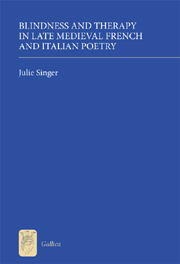Book contents
- Frontmatter
- Contents
- In loving memory of Mrs Doris Patz artist, benefactress, friend
- List of Illustrations
- Acknowledgements
- Introduction: On Rhetoric and Remedy
- Chapter 1 The Love-Imprint
- Chapter 2 Medical Blindness, Rhetorical Insight
- Chapter 3 Irony, or the Therapeutics of Contraries
- Chapter 4 Metaphor as Experimental Medicine
- Chapter 5 Metonymy and Prosthesis
- Chapter 6 Blindfold Synecdoche
- Epilogue. Just Words
- Bibliography
- Index
- Already Published
Chapter 6 - Blindfold Synecdoche
Published online by Cambridge University Press: 12 September 2012
- Frontmatter
- Contents
- In loving memory of Mrs Doris Patz artist, benefactress, friend
- List of Illustrations
- Acknowledgements
- Introduction: On Rhetoric and Remedy
- Chapter 1 The Love-Imprint
- Chapter 2 Medical Blindness, Rhetorical Insight
- Chapter 3 Irony, or the Therapeutics of Contraries
- Chapter 4 Metaphor as Experimental Medicine
- Chapter 5 Metonymy and Prosthesis
- Chapter 6 Blindfold Synecdoche
- Epilogue. Just Words
- Bibliography
- Index
- Already Published
Summary
Les yeulx bandez, en mirouer me myre.
My eyes blindfold, I admire myself in a mirror.
Simonnet Caillau, ballade for the Concours de Blois, v. 20Treatment with likes, despite the less than unqualified success of Machaut's lyric prosthesis, continues to provide a fruitful avenue for late medieval attempts at rhetorical remedy. In our final group of texts, composed in the mid-fifteenth century, such therapy is effected through the replacement of key terms with a comprehensive, rather than a contiguous, discourse: that is, through synecdoche rather than metonymy. By means of this figure a whole can stand for one of its constituent parts and, as in the works of Martin le Franc, Pierre Michault, Charles d'Orléans, and Simonnet Caillau, a part (afflicted or otherwise) can come to represent a whole.
Synecdoche or sinodoche is characterized in Jacques de Vignay's translation of the Légende dorée, the word's first French-language attestation, as a ‘figure de gramaire’ by which a whole – in this case, a day – stands in for a part thereof. Despite contemporary semanticians' reservations about the validity of distinguishing pars pro toto synecdoche from the broader category of metonymy, then, we can see that medieval usage does in fact differentiate synecdoche, and part/whole synecdoche in particular, as a rhetorical figure separate and distinct from metonymy. Indeed, drawing upon the theological doctrine of concomitance, Caroline Walker Bynum has described synecdoche as a ‘habit of mind’ in late medieval Europe.
- Type
- Chapter
- Information
- Blindness and Therapy in Late Medieval French and Italian Poetry , pp. 187 - 210Publisher: Boydell & BrewerPrint publication year: 2011



